ANNUAL REPORT & IMPACT ANALYSIS 2021
2021: The year of creativity and innovative solutions Mahdi, Fadwa and Mahmoud about the impact of their work This is how Newbees contributes to an inclusive world
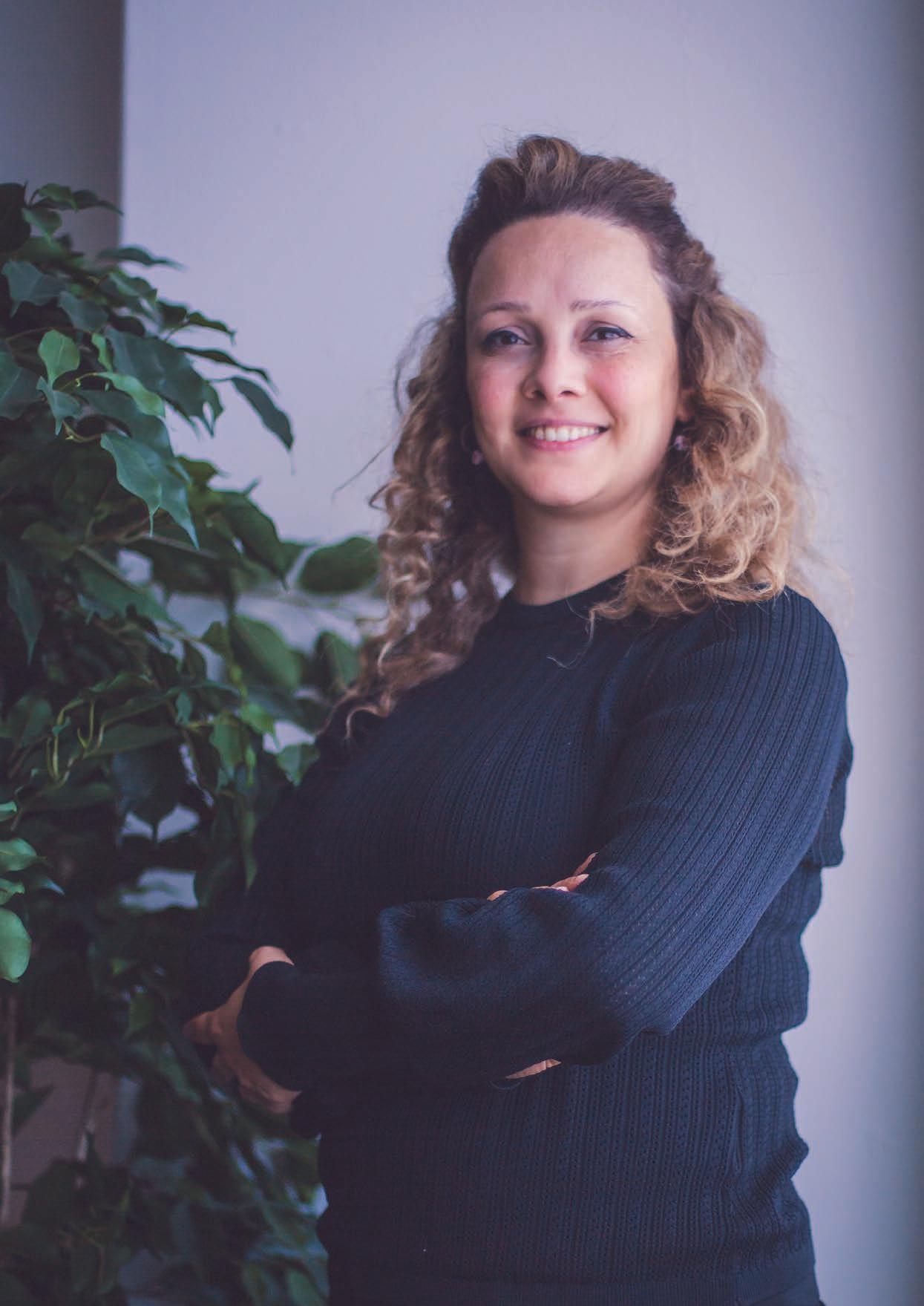
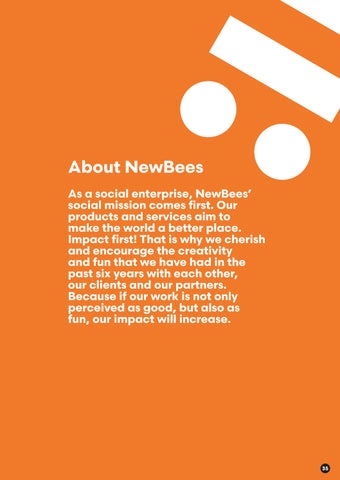
2021: The year of creativity and innovative solutions Mahdi, Fadwa and Mahmoud about the impact of their work This is how Newbees contributes to an inclusive world

Team day in Zaanstad September 2021 NewBees team members (clockwise): Kibrom, Valerie, Semhar, Zuleyha en Hussam
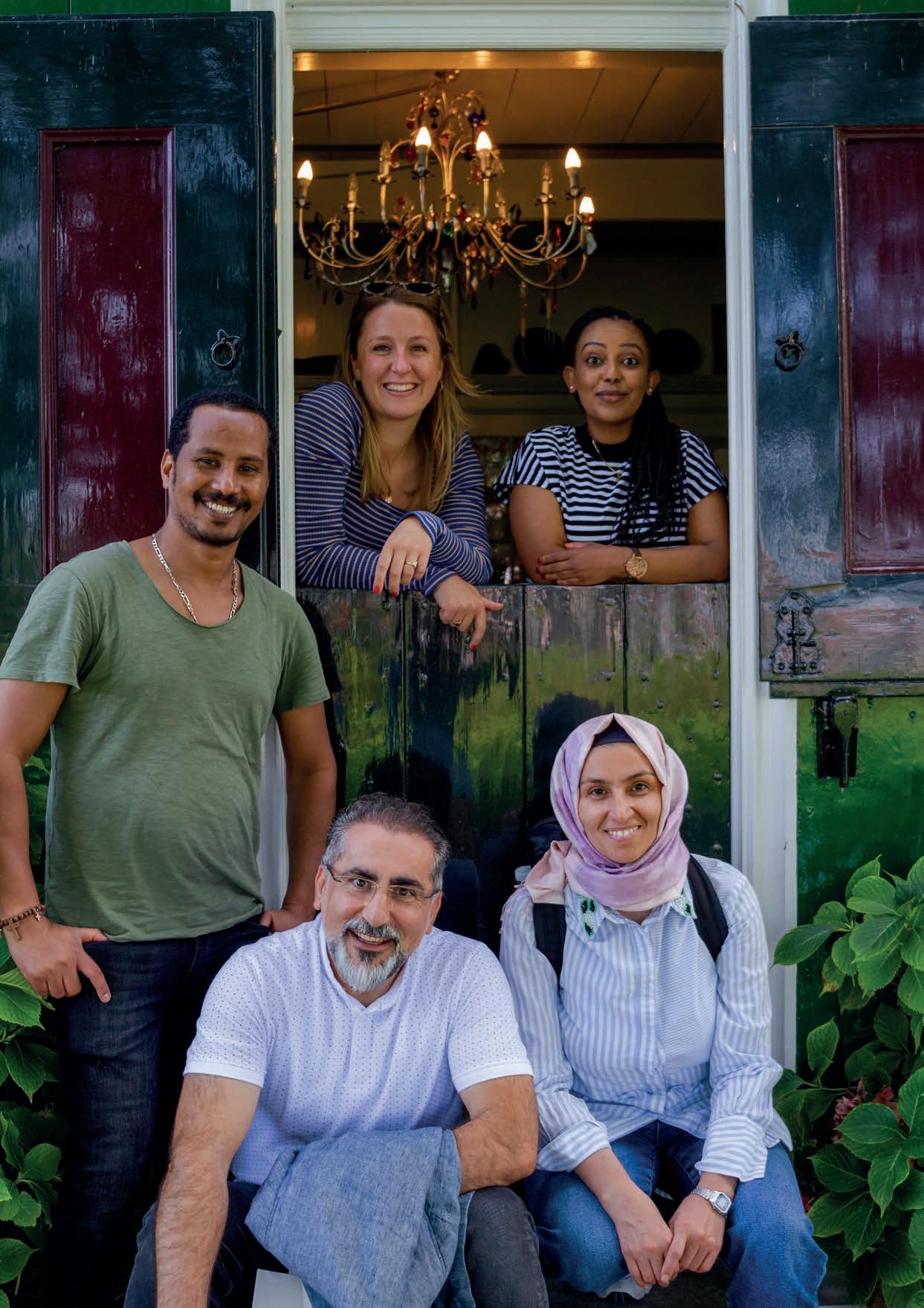
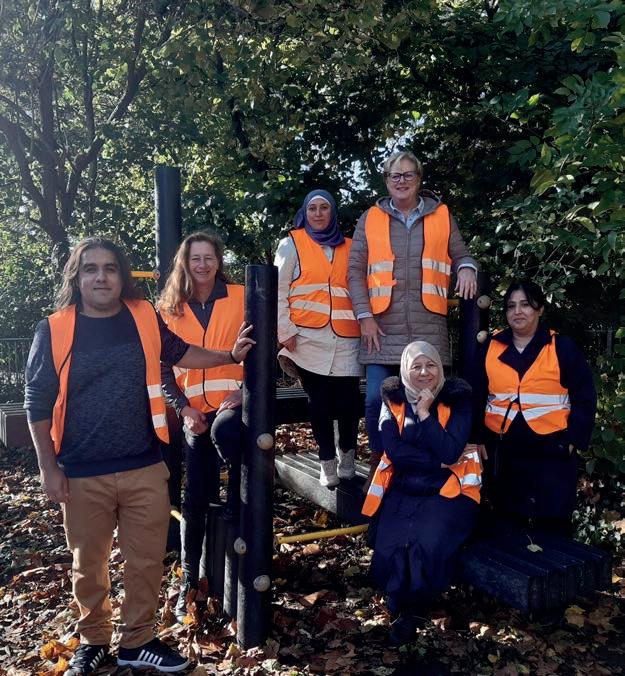
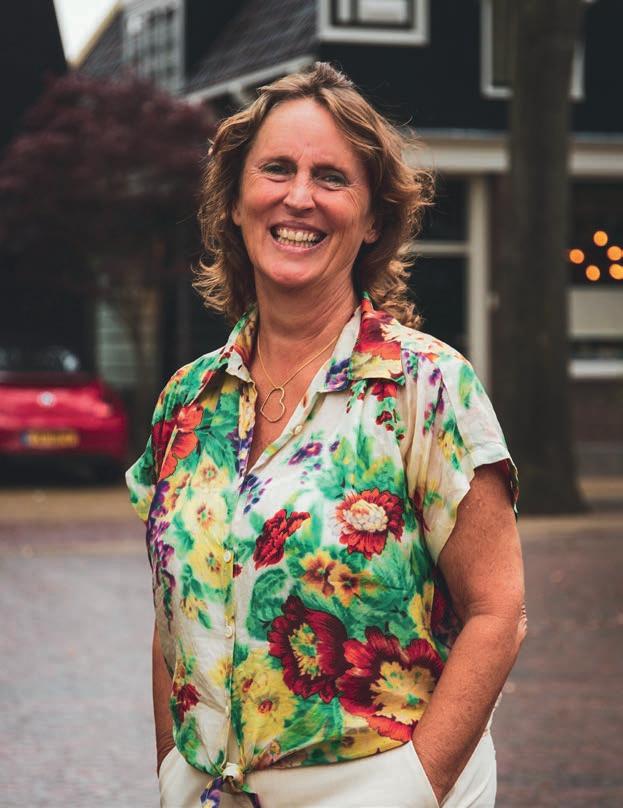
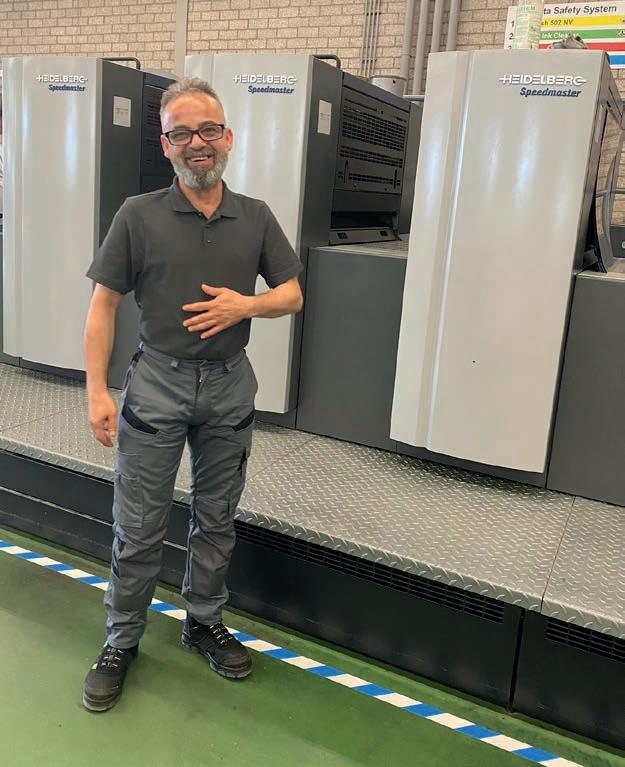
Mahdi: “I feel privileged because printing is my passion.”
At Brood & Spelen newcomers bring new talent to the teams and gain work experience
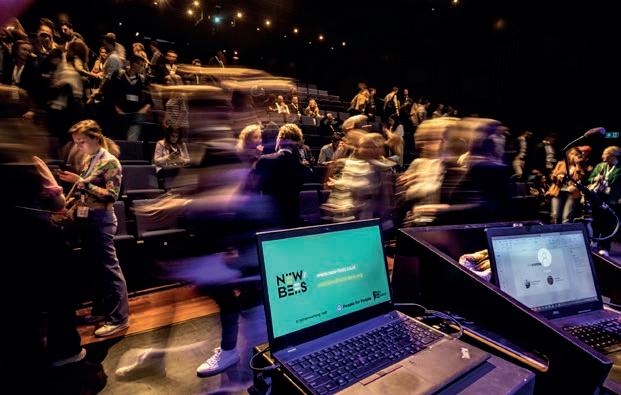
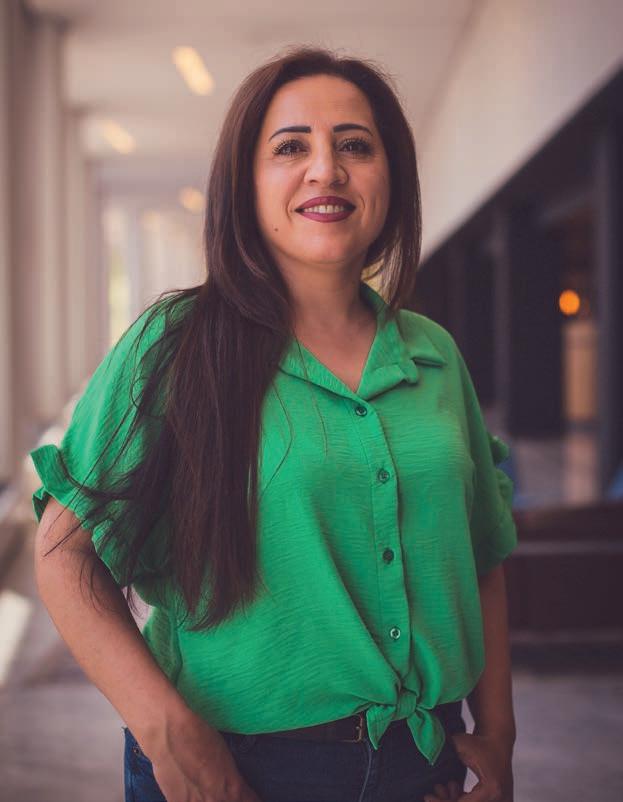
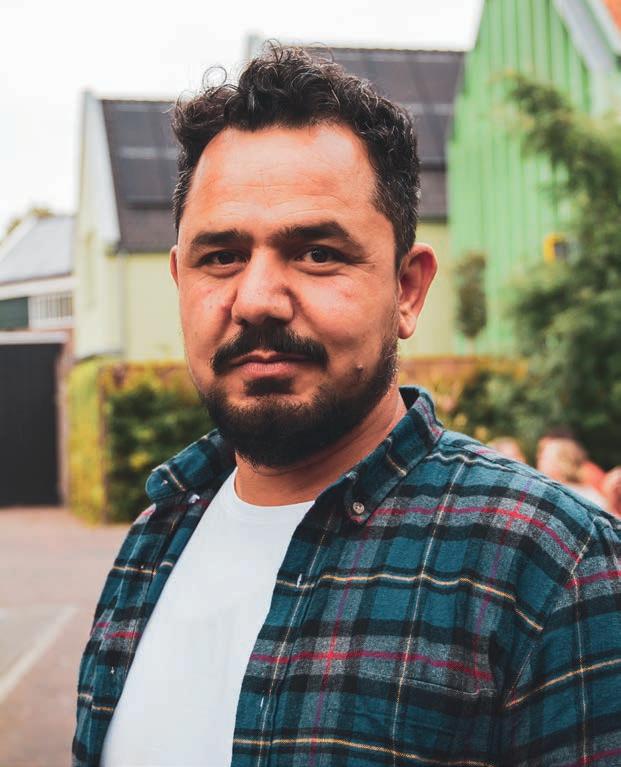
2021 started in lockdown. This was a difficult time for NewBees teams and participants. The strength of our matches and workshops lies in human contact and connection. A lockdown is about just the opposite of that. In the first half of 2021, there was no other option for us than mainly working online. Still, the teams managed to stay in close contact with our participants and make valuable, practical matches that improve the wellbeing of newcomers in the Netherlands. People continued to use and develop their talents.
Fortunately, as of the summer of 2021, it was once again possible to offer traineeships on location. We did this in the care sector, among others, where there was a high demand for extra help and support. The teams throughout the Netherlands proved to be immensely resilient and found creative practical solutions to all the setbacks caused by the pandemic, keeping both the quality and quantity of work, and the level of work satisfaction high. Fortunately, none of our colleagues fell seriously ill. We can therefore say that 2021 was a good and successful year, despite the numerous Corona setbacks.
In 2021, we made a difference in the lives of more than 550 participants throughout the Netherlands. At ten locations across the country, around 50 fantastic employees from countries including Syria, Eritrea, the Netherlands, Iraq, Israel, Belgium, Turkey and China worked on making matches that really mattered, matches that harnessed the talent of newcomers for the benefit of society. Both online and offline.
2021 was also the year that Dutch municipalities, and NewBees, prepared for the new Civic Integration Act of 2021. This act came into force on 1 January 2022. Municipalities started looking for providers of language lessons and participation for newcomers. We expanded our offer to include various modular participation activities, which tie in seamlessly with the education provided by our language partner NLtraining. Together, we applied for tenders and were awarded seven contracts in 45 municipalities. As of 1 January 2022, we will be offering the participation component of the new civic integration in these and a number of other municipalities.
We decided not to continue our work in Amersfoort, Utrecht and Friesland because we did not see any opportunities to make our work more sustainable there. By the end of 2021, we helped the last participants there to take the next step, and we said our goodbyes. Meanwhile, at the end of the year we started operating in Nijmegen. A team has been active there since October 2021, to offer Nijmegen newcomers traineeships in the area.
2021 was a special year, in which NewBees expanded its range of participation activities. We began offering our services as part of the civic integration process, to people who have just arrived in the Netherlands. We believe that this will significantly increase our impact. This will allow people to participate more quickly in Dutch society and the workplace. This is how we are contributing to make the Netherlands more inclusive.
In this annual report, we share with you the impact of our work in 2021. We will do this on the basis of our impact measurement and a number of first-hand stories from employees and participants. We will also show you our plans for the future, because we will continue to work towards a more inclusive Netherlands.
Happy reading!
Annemiek Dresen and Dorien Marres, directors of NewBees
NewBees works towards an inclusive world, where everyone participates. This starts with an inclusive workplace, where there is room for everyone, for every talent.
NewBees makes room for talent. For newcomers who want to integrate and gain work experience, for municipalities that welcome them and for employers who strive for inclusion, in whatever field. We do this by setting a good example as an inclusive employer, by offering practical solutions, and by providing insight into the impact we have.
• We organise inclusive civic integration for municipalities and offer both participation and dual programmes. We work together with language provider NLtraining, thus combining language with practice.
• We coach newcomers working for local entrepreneurs and organizations in our traineeships. Talent, tailor-made solutions and personal guidance are central to our working method. Our experts know how to motivate newcomers like no other. They also function as a bridge between newcomers and organizations.

• We advise and coach companies in the field of Diversity and Inclusion. We experience the benefits of an inclusive workplace on a daily basis; half of our team consists of newcomers. This makes Newbees an expert in the field of inclusion and diversity.
• We measure the financial, social and societal impact of our work so that we can continually improve our service and understand our added value. Our impact measurement shows that NewBees adds value for our participants, for companies, organizations, municipalities and society as a whole.

“ By measuring and analysing the impact of our work, we are getting a better understanding of how civic integration works best for newcomers in the Netherlands.”
Annemiek Dresen
For the second consecutive year, we are publishing our results in an annual report based on the impact of our work. We do this because, as a social enterprise, we are convinced that our achievements extend beyond counting the euros spent or the number of people we have mentored in a traineeship. In fact, it’s about the impact our work has on the people who do a traineeship, on the employers where they add value and on the society they live in. By only looking at the annual figures, it almost seems as if that impact is not important, while it is actually the most important thing. That is why we report in an integrated way. This is how we show the financial, social and societal impact of our work.
The impact that NewBees measures concerns the overall effect of NewBees’ work. Take the increased well-being or language development of participants for example. We measure this for all stakeholders involved; participants, companies where traineeships are shaped, the NewBees organization itself, the government, and society.
To reflect how our impact comes about, we use the impact pathway model from the ‘Framework for Impact Statements’, which is based on Input - Output - Outcome - Impact. At NewBees we use the terms: Resources - Activities - OutcomeImpact. Using this model, we present this report. In the next four chapters we shed light on each of the steps in the model. This ultimately leads to Chapter 4: NewBees’ impact in 2021. Financial information is incorporated into these sections and compared to the non-financial (or holistic) impact, in order to show the true value of our impact.
Our impact measurement is scientifically substantiated. We use, among others, the Framework for Impact Statements (FIS) and the Integrated Profit & Loss Assessment Methodology (IAM Core) of the Impact Institute, statistical analyses based on data from the European Social Survey (ESS) and both qualitative and quantitative research among our stakeholders.
To measure and visualize the impact NewBees makes, we work together with the Impact Institute. The Impact Institute enables organizations to implement the impact economy by creating a common language for impact and developing the tools and training to apply this in practice. www.impactinstitute.com
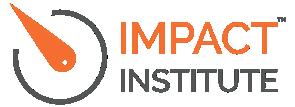
NewBees
• Financial Resources
• Employees
• Locations
By allocating these resources, NewBees can organize its activities, such as; intakes, workshops, traineeships, personal guidance, etc. This involves expenses.
These activities result in an effect in NewBees’ direct sphere of influence; an outcome, such as:
• The number of participants who took part in a traineeship at NewBees
• But also the number of matches made
When measuring impact, we go a step further and look at the change that impact brings about for the various stakeholders. We do this through a reference scenario. So, what effect did the NewBees traineeship have on participants versus non-participants.
can only achieve results when the right resources are available. For instance:
In 2021, NewBees invested in the quality of our teams, people and tools. Building on the experience of the past years, we continued to train our staff and developed additional tools.
In the past year, for example, we had a better idea of how to deal with the effects of the Corona crisis on our locations, employees and participants. With creative and innovative solutions, we stayed in close touch with our participants and colleagues to ensure that their talent could continue to develop, even if it was often online.
In the past year, at our 9 locations, 46 employees were responsible for the implementation of NewBees’ traineeships and other activities. They made meaningful matches for participants in 14 Dutch municipalities.
In view of the new Civic Integration Act, which came into force on 1 January 2022, we also invested in the modular design of our services so that they can be used within our dual programmes. The aim here is to bring language and participation closer together, in order to ultimately have a more positive impact on our participants.
The new Civic Integration Act, which came into force on 1 January 2022, gives municipalities the coordinating role in civic integration and makes them responsible for its implementation. As an expert in participation, NewBees wanted to play a role in the design and implementation of the participation component of the new Act. “To realise this ambition, we have invested in our resources; both people and tools,” says Dorien Marres, operational director of NewBees.
Dorien: “Together with our language partner NL Training, we drafted tenders and offers. We also modularized our resources to meet the requirements of the new law and to offer good solutions to municipalities. In addition to what we already do, which is to help newcomers find their way in the Dutch labor market with the NewBees traineeship, we have designed new tools, such as the neighborhood safaris, the film education programme and the MAP workshop (Labor Market and Participation Module). We have also further developed our IT system and CRM to facilitate easy time registration, because this plays a major role in the new Act. If persons integrating have not completed the minimum number of participation hours by the end of their programme, they are not considered to be ‘integrated’”.
“These tools were all conceived and created in 2021 to ensure that we were ready for the implementation of the new law on 1 January 2022. In addition to investing in tools and systems, NewBees also invests in its own people, in its teams, in particular through the NewBees Academy. This is a series of workshops, training courses and coaching sessions aimed at training and supporting our staff in all their work. For example, there are courses on coaching and on intake interviews.
How do you ensure good communication with the participants? How do you ensure that participants and their employers understand each other? What is active listening and why is it important? But we also offer a workshop on privacy and a communication training course where we explain social media guidelines, among other things.” 2021 was the year of creativity and innovative solutions.
“From 1 January 2022, the teams in their respective cities will be ready to implement the new tools and programmes for the integration of our participants. Our challenge for 2022; to preserve the creativity and fun that we have been sharing with each other, our clients and our partners for the past six years, within our more formal role in this new structure. After all, if our work is not only perceived as good but also as fun by all stakeholders, our impact will be greater. We want newcomers who come to NewBees to benefit from the programme and to enjoy participating in it.”
Marres, Operational Director NewBees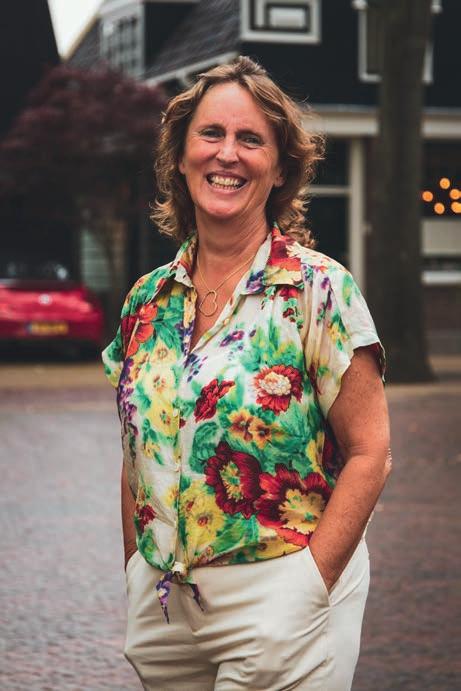
Through the allocation of available funds, NewBees can organize its activities: linking newcomers to local organizations and companies in traineeships, on the basis of talent and equality.
Because of the severe lockdown at the start of 2021, it was difficult to arrange physical traineeships. That is why, at the beginning of 2021, we looked for other, often online, solutions for our newbies, such as online workshops and network meetings. Here, our matchmakers paired newbies with people who could show them the ropes in their field of expertise or interest. For example, people with a background in finance talked to a Dutch financial expert to learn about the opportunities in this field. Especially in the period of time when many people were sitting at home and it was not possible to meet in groups, this proved to be of great value.
In the summer, the corona measures were relaxed, making on-site traineeships possible again. We did this, among other sectors, in the care and hospitality industry, where extra hands were very welcome due to large staff shortages.
In addition, we conducted many activities in preparation for the New Civic Integration Act. We expanded our services to include innovative, modular, participation activities and, together with language partner NLtraining, submitted tenders in various municipalities. Also, the dual programme that we designed with NLtraining was tested in five Frisian municipalities as part of the ‘Zelf aan Zet’ pilot project.
“We have been greatly helped by three ladies of NewBees, three major forces in Amersfoort. One of them has years of experience in education and hopes to work at a playgroup in the future. Another is an administrative worker but is so enthusiastic about ‘Brood & Spelen’ that she wants to continue working in education. These ladies are crucial to working parents and childcare. We need people. Newcomers want to gain work experience and bring new talent to the teams. It really is a winwin situation for everyone; for schools, parents, newcomers, municipalities and for us.”
At the start of the 2021-22 school year, our matchmakers in Amersfoort matched three newbies with a traineeship at Brood & Spelen, an organization active in providing lunchtime care (TSO), playground supervision and after-school care (BSO). Nikki Porter, responsible for recruitment and selection, talks about the organization’s vision on diversity and inclusion.
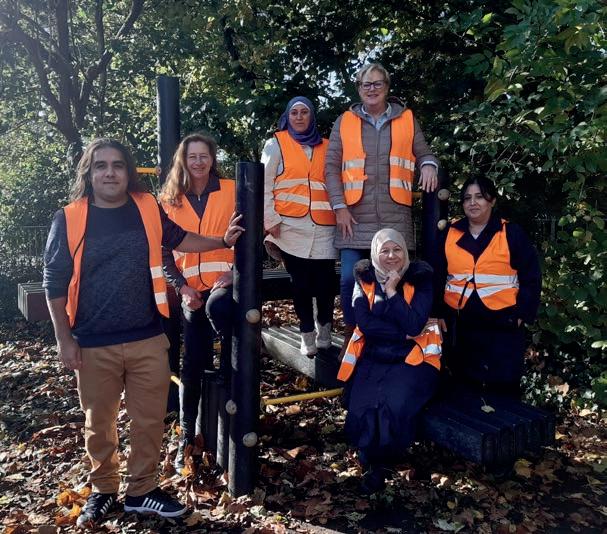
Nikki: “At Brood & Spelen we strive to create an environment where children can be themselves and at the same time discover and experience all kinds of things. An environment where they can grow up to be unique individuals who are confident, worldly and socially aware. In order to realize this, it is important to put together a team as diverse as possible with educational staff and volunteers who have different backgrounds, traditions, interests, experience and talents.”
“At some schools you have teams of 10 or even 12 volunteers. They often arrive at school 15 to 30 minutes early, to enjoy the moment of contact with colleagues. They drink a cup-a-soup or a cup of tea together. They meet on the (school) square and organize activities. After work, they give each other feedback. How did it go? What did you find difficult? What went well? These are important moments: The opportunity to practice the language and learn from each other.”
“Both coordinators and volunteers deal well with diversity. We are proud of that. Everyone is open to each other and engages in conversation. That way you can feel and hear who someone is and what goes on inside that person. During training sessions, we sometimes notice that the message does not come across properly. In that case we take a different approach to make sure everyone understands and participates. In order to achieve an inclusive workplace, you have to make some adjustments.”
Sign up through the NewBees online platform Intake Intake with a matcher to get to know each other
Networking conversation
Informal contact with someone from the neighborhood who has the same profession or hobby
Search Search for a suitable place in the vicinity to develop talents
Introduction Meet a potential employer or traineeship supervisor Throughout
Workshops on various useful topics, such as the Dutch labor market or how to apply for a job
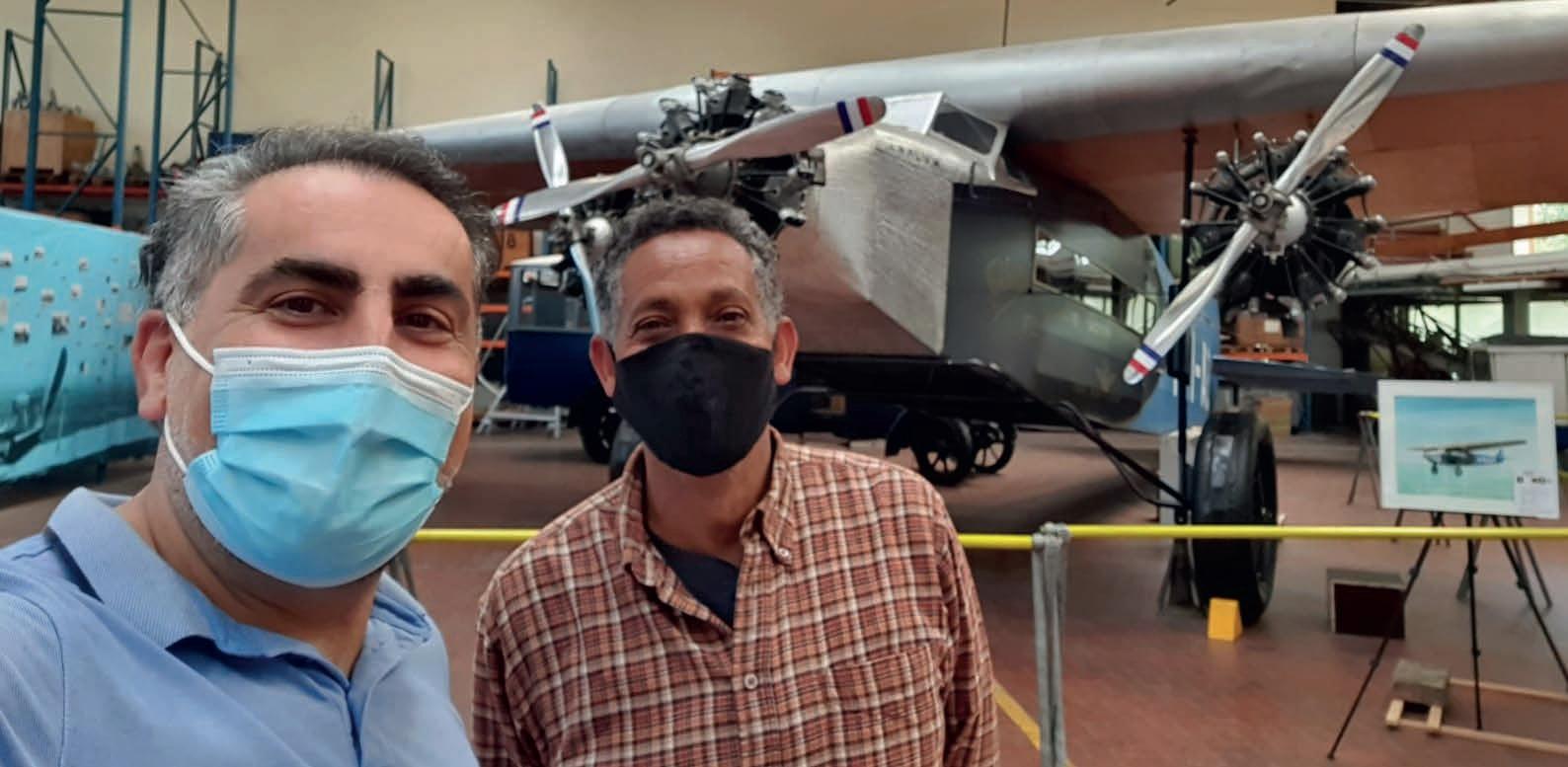
NewBees’ resources and activities have an effect in NewBees’ direct sphere of influence; our outcome. In 2021, 556 participants were matched to traineeships and personally coached by our dedicated matchers. In our 1142 matches, they participated in workshops, completed internships, were offered networking opportunities, volunteered in traineeships and found paid jobs.
On average, participants rate the NewBees traineeship with a 7.9 and 89% of the newbies would recommend the traineeship to others. The majority of our participants are between 20 and 40 years old. The largest group is from Syria. Although at some locations, such as Leeuwarden, there are more Eritrean participants. In addition, last year we saw an increase in Turkish participants.
Our traineeships are always tailor-made, including the duration and design of the traineeship. For some, a workshop series of four weeks is enough, for others the traineeship will last more than half a year. Our matchmaker and the newbie determine together what is needed; how long a
Total number of unique participants (2020: 388 unique participants)
About our newbies: Gender
Country of Origin Number of countries: 56 Age
traineeship will last, and with which organization in which sector, for example. Compared to last year, we see an increase in participants who started working in the social work sector.
On average, our participants each attended just over three workshops. Their traineeships lasted an average of 23 weeks. Because some participants were matched more than once, for example to different people for a networking session, or to different series of workshops, the number of matches is considerably higher than the number of unique participants. On average, participants were matched to an activity twice.
Total number of matches (2020: 620 matches)
About our matches: Work areas Participants per location
Average duration of traineeship: 23,5 weken
Total participants in online workshops: 751
Total number of collaborating partners: 656
Mahdi Janabi (50) came to the Netherlands at the end of 2015. He has years of experience in the printing business in Lebanon and is therefore very happy that through NewBees he was linked to a traineeship at Kapsenberg van Waesberge, the foremost printing company in Rotterdam.
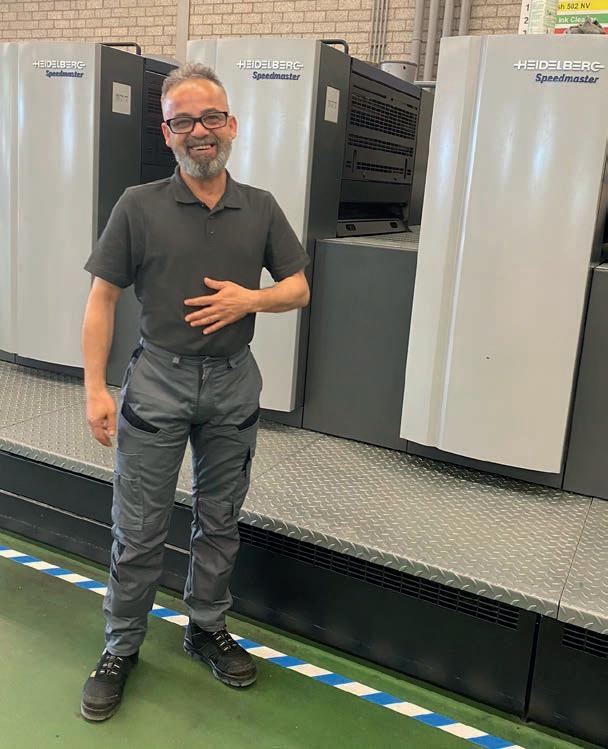
Mahdi: “I feel privileged with this internship. Printing is my passion. It wouldn’t be so bad to do something that doesn’t suit me one hundred per cent. Work is important and anything is better than staying at home. I didn’t expect NewBees to find a traineeship that matches my talent and ambition exactly. That’s why I’m extra happy. I studied at the University of Technology in Iraq and later went to Beirut (Lebanon) to work at the Arab Printing Press, known internationally for the high standard and quality of their
printing. It was my dream to work there and I did for 15 years. Three days a week I do an internship at Kapsenberg van Waesberge. Moreover, the work is very good for practicing my Dutch, for better understanding the work culture and for learning new printing techniques. Because everything changes quickly in this profession.”
“When I came to the Netherlands, I did volunteer work at the asylum seekers’ centre, as a translator for VluchtelingenWerk Nederland. It took 2.5 years to get my residence permit, after that, my long search for a job started. At the start of this year, the municipality sent me information about NewBees. I contacted them immediately and shortly afterwards I met my matchmaker Nagham at the office for an intake. It did not take long for her to find the vacancy at the print shop. I sent her my CV and we went to the interview together. I was hired straight away. My internship lasts until the end of 2021. It would be great if I could get a contract for a paid position. That is my dream. But whatever happens, Kapsenberg van Waesberge is a wonderful name and reference on my CV.”
“They call themselves the printer of Rotterdam, because for centuries Van Waesberge was the regular printer of the municipality. The printery has been around since 1590! What I like is that we use old techniques to achieve special effects as well as very modern technology. We print everything: business cards, folders, posters, books and also works of art. I am an art lover and a painter myself. That’s another reason why I like this work so much, printing is art!”
At the time of the interview, Mahdi was still doing an internship at Kapsenberg van Waesberge. He is now employed by the printing company in Rotterdam. “This means that we have an excellent graphic craftsman in house!” Kapsenberg van Waesberge wrote on their LinkedIn page.
Mahdi: “I feel privileged because printing is my passion.”
When measuring our impact, we look at the change that the results of NewBees’ activities bring about for various stakeholders. We do this in comparison to a reference scenario. So, what effect has the NewBees traineeship had on participants versus non-participants.
We measure our impact per stakeholder (participants, companies, NewBees, municipalities, society), both for the entire organization and per NewBees location. With this measurement, we map out the intellectual, social and human capital of our working method. We express these impacts in Euros, which enables us to compare different impacts and put them into perspective. We show how much social impact NewBees has and make the importance of our working method visible and tangible.
NewBees organization
Positive impact € 7.000 (2020: € 7.000) Negative impact € 0 (2020: € 0)
Society
Positive impact € 17.000 (2020: € 8.000) Negative impact € 500 (2020: € 2.000)
Companies and organizations
Positive impact € 11.000 (2020: € 7.000) Negative impact € 1.600 (2020: € 2.500)
Government and municipalities
Positive impact € 12.500 (2020: € 8.500) Negative impact € 1.600 (2020: € 1.100)
2021 was an unprecedented impact year for NewBees, despite measures surrounding the coronavirus. More than 500 people participated in our traineeships, collectively experiencing an increased well-being equivalent to € 42,000 per person. That’s almost twenty times what each traineeship cost.
The average positive impact per traineeship in 2021 was considerably higher than in 2020. This is mainly due to extended traineeships and increased participation in workshops by participants.
Positive impact € 42.000 (2020: € 29.000) Negative impact € 1.600 (2020: € 1.100)
(2020: € 59.000)
Because of the extended traineeship, we see that the job probability of participants increased in 2021. Moreover, primary data shows that the majority of participants from previous years do indeed keep their jobs. This has a positive impact on public spending.
Government contributions to NewBees’ operations increased in 2021 vs. 2020. This has to do with the fact that more of NewBees’ work is being purchased by Dutch municipalities.
The positive impact on our own employees has declined slightly. This is mainly because the number of employees did not increase much in 2021, while the number of participants increased significantly.
The average positive impact per traineeship for employers and traineeship providers increased due to the increased length of the traineeship; participants added more value. The average negative impact for supervising employers decreased. Especially because they indicated they were investing less hours in guidance than in 2020.
In 2021, more participants indicated that they come from large households. As a result, the impact on the environment of our participants doubled. Negative impact on society shrank significantly. This is largely because the contribution of non-governmental institutions to NewBees as an organization decreased, relatively speaking.
During and after the NewBees traineeship, participants experience more well-being and autonomy. This is due to both the actual work that they do and the social contacts, language acquisition and cultural integration that comes with this work. As a result, the well-being of each of our participants increases and they have a better chance of finding a job.
NewBees has an indirect impact on the government, because an increased job probability of participants leads to a reduction in benefit expenditure and higher income tax. In addition, it leads to lower expenditure for the promotion of labor participation. The largest negative impact on the government concerns the financial burden associated with the implementation of the NewBees traineeships for, mostly, local governments.
At the companies and organizations where newbies do their traineeship, NewBees primarily has a financial impact; newbies deliver work, but also cost time and attention to train, as one would expect from trainees. Besides this financial impact, attracting a newbie also has an impact on customer satisfaction, employee loyalty and reputation.
The increased employment opportunity and the increased sense of autonomy of the traineeship participants have a direct impact on the people around them; their family members and other members of their households. The negative impact on society consists of contributions made to the NewBees organization by foundations and other non-governmental organizations in order to carry out NewBees’ work.
The greatest impact that the work of NewBees has on its own organization is through payments to employees. With 50% of its employees being newcomers, NewBees offers this new talent direct employment and development opportunities. This has a positive impact on all employees, among other things because new contacts are made.
Another impact on society, which plays an important role in the public debate, is the perception of displacement in the labor market in relation to newcomers. This does not concern actual displacement, but a perception that is alive in society and is much discussed. This impact was measured qualitatively by NewBees and Impact Institute, but is not directly related to the work of NewBees. Therefore, we report this impact separately. We aim to reduce this negative impact by increasing the work we do and the positive impact we have on society. In 2021, this impact was approximately €6 million.
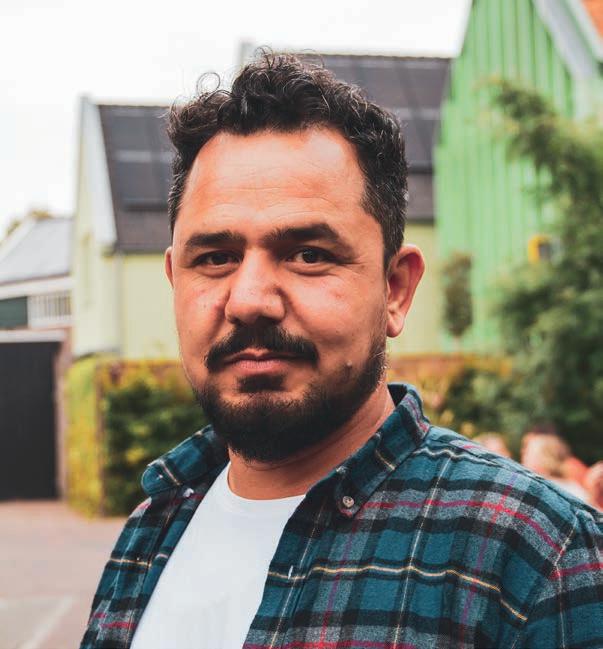
language, I did not manage to find a paid job. Still, I remained positive and made a plan; pass the B2 exam and study ‘Conflict & Peace’ at Utrecht University. My plan changed when I discovered the matchmaking vacancy at NewBees in Arnhem. I applied, decided to postpone my studies and accepted the job at NewBees”.
“I work three days at NewBees, the other two days as a volunteer for Vluchtelingenwerk Nederland. How special that I am able to use my personal experience in my work. I looked for work in the Netherlands for three years, and now I guide newcomers towards a job. I am happy that I can do this work. I know what they are going through, I know the obstacles. The work culture in the Netherlands is different from Syria. Here there is more structure, as an employee you have more rights and more stability. On the other hand, here you have to deal with heavy bureaucracy and many rules.”
Mahmoud (35) is from Kobani, a town in Syria on the border with Turkey. He was an English teacher in primary and secondary schools for seven years, until 2014 when he had to flee to Turkey. Because of his high level of English, Mahmoud worked for several international NGOs, first as a translator and later also as a case manager. In December 2017 Mahmoud came to the Netherlands, following his brother. He lives in a small village between Arnhem and Tiel. Since April 2021 he has been working part-time as a matcher at NewBees in Arnhem. This is his first paid job in the Netherlands.
“I always try to keep busy. If I sit at home and do nothing, memories and traumas come up. That is why work is very important for me. Despite my work experience and knowledge of the English
“For three years, I felt that I was worth nothing. I was depressed. Fortunately, everything changed when I got my first paid job at NewBees. I am motivated, I feel good. I see a different person in the mirror. I look at myself and at life in a different way. My brother and his children also see that I am doing well and they are very happy for me. Of course, volunteering also gives me satisfaction. But the difference and impact of this paid job lies in the feeling of self-reliance and self-worth. I no longer depend on benefits.”
“I also feel more connected to society now. Almost every day I have contact with my colleagues and through my work my network is growing. I meet a lot of new people at all kinds of organizations. I am happy with the social relationships I am developing. I am getting better at expressing myself in Dutch. I am proud of myself.”
Primary data is data collected by NewBees from its own sources, using methods such as surveys or interviews. All our participants and a selection of other stakeholders provide feedback through questionnaires and focus groups. This data is collected in order to measure the impact and satisfaction of our stakeholders, directly from primary sources. Secondary data is data collected from existing (academic) studies, surveys or experiments conducted by other parties or for other research. The shaded impacts are so-called ‘qualitative impacts’. These impacts have been calculated on the basis of a ratio with the greatest impact. The order of magnitude of these impacts is an estimate based on the examination of secondary data.
The scope of the analysis looks at the activities of NewBees in 2021 by the different teams and in a variety of municipalities in the Netherlands, and their impact over the following two years. In the graph below, data from all teams is included, except for the recently started team in Nijmegen. For that location, the impact data will be included from 2022 onwards. Long-term capital creation is an exception, as this effect focuses on long-term effects (2024 and beyond). In order to also measure long-term impact, each year various stakeholders are interviewed who have been involved with NewBees in the past three years. For this assessment, 92 participants who completed a traineeship in previous years were interviewed.
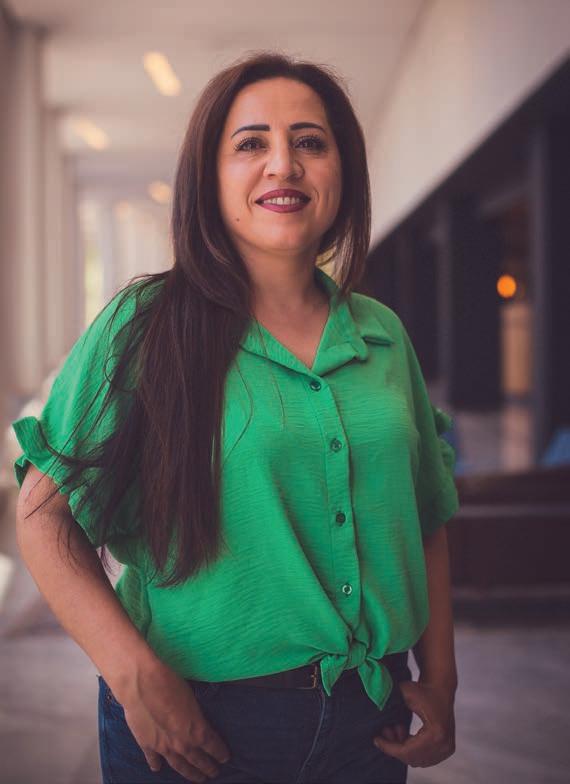
“I grew up in Salamia and went to university in Damascus to study law. I graduated in 2000 and immediately after my internship I opened my own law firm. For fifteen years I worked hard and focused on my future. In 2015 I had to flee and because of this I lost everything. When I came to the Netherlands I started looking for a job. Work has always been important to me. If I had to stay at home I would go crazy.”
“Ik ben in Salamia opgegroeid en ging naar de universiteit in Damascus om rechten te studeren. In 2000 studeerde ik af en meteen na mijn stageperiode opende ik mijn eigen advocatenkantoor. Gedurende vijftien jaar werkte ik hard en bouwde ik aan mijn toekomst. In 2015 moest ik vluchten en hierdoor verloor ik alles. Toen ik in Nederland kwam ging ik op zoek naar een baan. Werk was altijd belangrijk voor mij, als ik thuis moet blijven dan word ik gek.”
Fadwa lives in Vlaardingen with her husband and two sons. Before coming to the Netherlands in 2015, she worked in Syria as a lawyer for fifteen years. Her Dutch language skills are not yet sufficient to find a job in her field of work.
Fadwa: “I came into contact with NewBees through a friend. I met Helen, a matchmaker, in Rotterdam for an intake interview. Shortly afterwards she proposed a traineeship as an accountant at the Buddy Film Foundation. At first I thought I wasn’t suitable for the job, I didn’t study for it, did I? But I’m good at math and I’m a quick study.”
“My work also has a positive impact on our family. I talk about it a lot at home. My husband and my children are proud of me. As a mother, I am a role model for my boys. I encourage them to focus more on their studies, to speak Dutch often. The eldest is at MBO-2 and the youngest at MBO. They get good grades, especially in math. According to their teachers, it is for the best if they take a little longer, as long as there is progress; so first MAVO and then HAVO. They are right. It hasn’t been easy for my children, they have it good now. I hope to have a nice full-time job in four or five years’ time. Above all, I want to build a good, peaceful and healthy life with my family in the Netherlands.”
In 2022, NewBees will continue to work on good integration and civic engagement, for and by newcomers. In addition, we will build on our practical experience to guide employers in shaping an inclusive workplace.
On 1 January 2022, the new Civic Integration Act came into effect. An important focus of this new Act is learning language through practice, so that language and participation reinforce each other. The underlying idea is that this is the quickest way for those integrating to fully start participating in society and to find paid employment.
Municipalities are responsible for implementing the Act. They often entrust these integration activities (partly) to external experts, and in the past year they have put out tenders for these activities. NewBees has been awarded seven contracts and by 2022 Newbees will be guiding newcomers towards participation on behalf of more than 40 municipalities.
Together with language partner NLtraining, we offer dual courses for both the B1 route and the Z route, in which language and practice are aligned with each other. NLtraining has over 15 years of experience in teaching Dutch as a second language. In our programmes for integration, we link this experience to NewBees’ knowledge of participating in the Netherlands: in dual trajectory programmes, participants immediately put language into practice and vice versa. We know from experience that people learn to apply and master the language faster this way. Our participation programmes can also be implemented under the Participation Act, or for example for people who are part of the so-called ‘Ondertussengroep’ (‘interim group’); those who do not fall under the new Civic Integration Act, since they received their asylum status before 1 January 2022, but who do benefit from maximum participation based on their talent. For this group of people, our participation programmes are kept closely aligned with any language lessons they are still taking.
Our programmes are tailor-made and consist of building blocks that can be flexibly deployed: Learning and experience modules that are integrally connected to each other, to the daily activities and to the environment of the participants. The building blocks are designed on the basis of our many years of experience with participation for and by newcomers, and they are combined in a modular way.
In order to properly prepare for the New Civic Integration Act, in 2021 we carried out pilot projects in cooperation with various municipalities. In these pilots, we tested our dual programmes that combine language education and labor participation. On average, participants rated these programmes with an 8. This shows that the programmes really do add value.
Our approach is digitally supported by our innovative online NewBees platform, which we developed ourselves with our team of programmers who are also newcomers. This platform serves as an online portfolio and ensures that participants, NewBees teams and staff members from different municipalities can always see the progress made.
At the end of the participation process, the participant has complemented their online portfolio with useful experiences, qualities, competences, skills, knowledge and certificates. This serves as a wellstructured and nicely laid out CV, for the participants to use independently and to enter the labor market.
We enjoy using our expertise to support newcomers, so that they can fully participate in local society from day one and experience a high degree of self-reliance in their lives. Together we make sure that society remains a place where everyone is welcome and everyone contributes.
Intake
Every programme at NewBees starts with an extensive intake using our innovative card set with 40 open questions about ‘connection to the Netherlands’, ‘self-confidence’, ‘self-reliance’ and ‘work’. This way, we get to know the participant, their talent, their experiences, and their level of self-confidence.
Neighborhood safari
Participants go on a joint discovery tour of the neighborhood to welfare organizations, sports clubs and social organizations. Neighborhood safaris are an interactive way to use language to gain knowledge about a neighborhood, a professional field, or any other subject that plays an important role in the local environment.
Participants learn to use the Dutch language in order to move around independently in the neighborhood.
Practical activities
Practical activities are low-threshold programmes allow persons integrating to increase their practical knowledge and confidence from day one. This building block consists of three elements:
1) Themed workshops on various living areas in cooperation with local partners from the neighborhood;
2) Our film education programme in which participants have a weekly film screening together with assignments on various language and self-reliance levels;
3) Networking conversations with people from the neighborhood on the basis of a similar hobby, profession, age or neighborhood.
Volunteering and language internships
Participants are matched with voluntary work or a (language) internship that matches their talent. This building block can also be deployed separately as the NewBees traineeship. People receive a certificate after completing this unit and have more selfknowledge, self-confidence and a realistic picture of their career opportunities in the Netherlands.
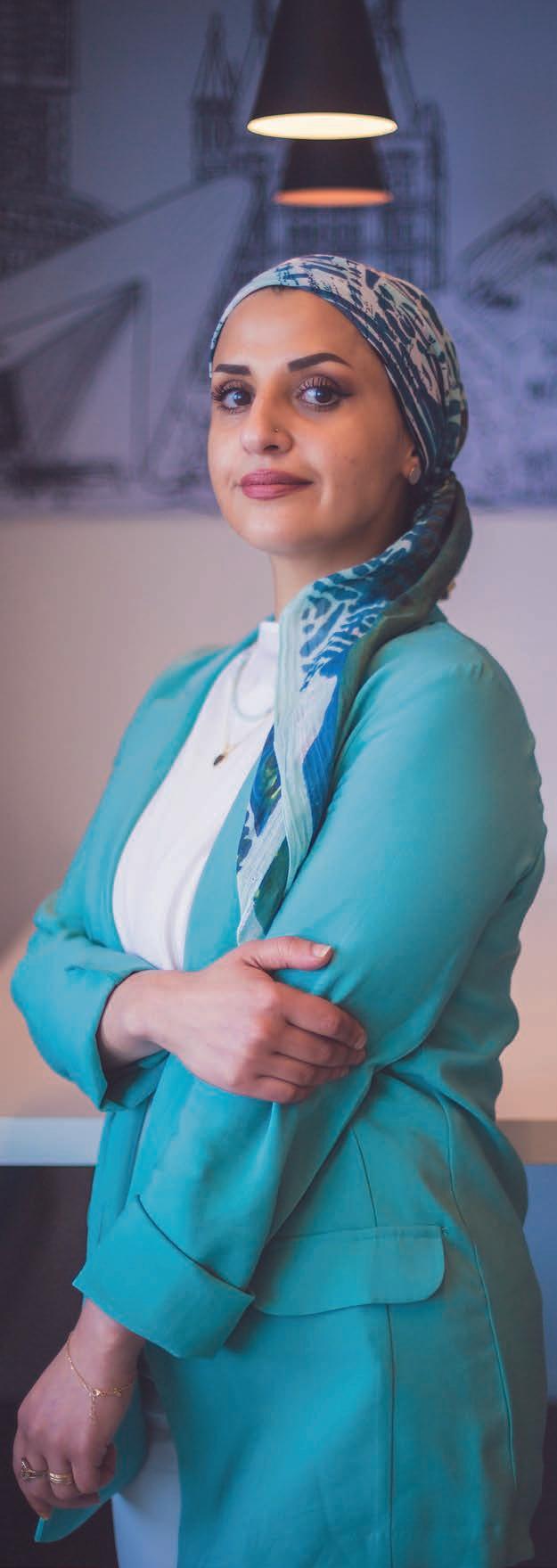
Apprenticeship/job
NewBees offers municipalities, employment companies and social services the use of our expertise in matching and guiding apprenticeships and paid jobs in the local environment.
Locations Amsterdam, Arnhem, Drechtsteden, Haarlemmermeer, Holland-Rijnland, Nijmegen, Rotterdam, West-Friesland, Zaanstad.
Diversity & Inclusion (D&I) are hot topics. And rightly so. Inclusive employers with a diverse workforce attract new talent and potential customers. Moreover, evidence is growing that inclusive teams are more productive and have lower turnover.
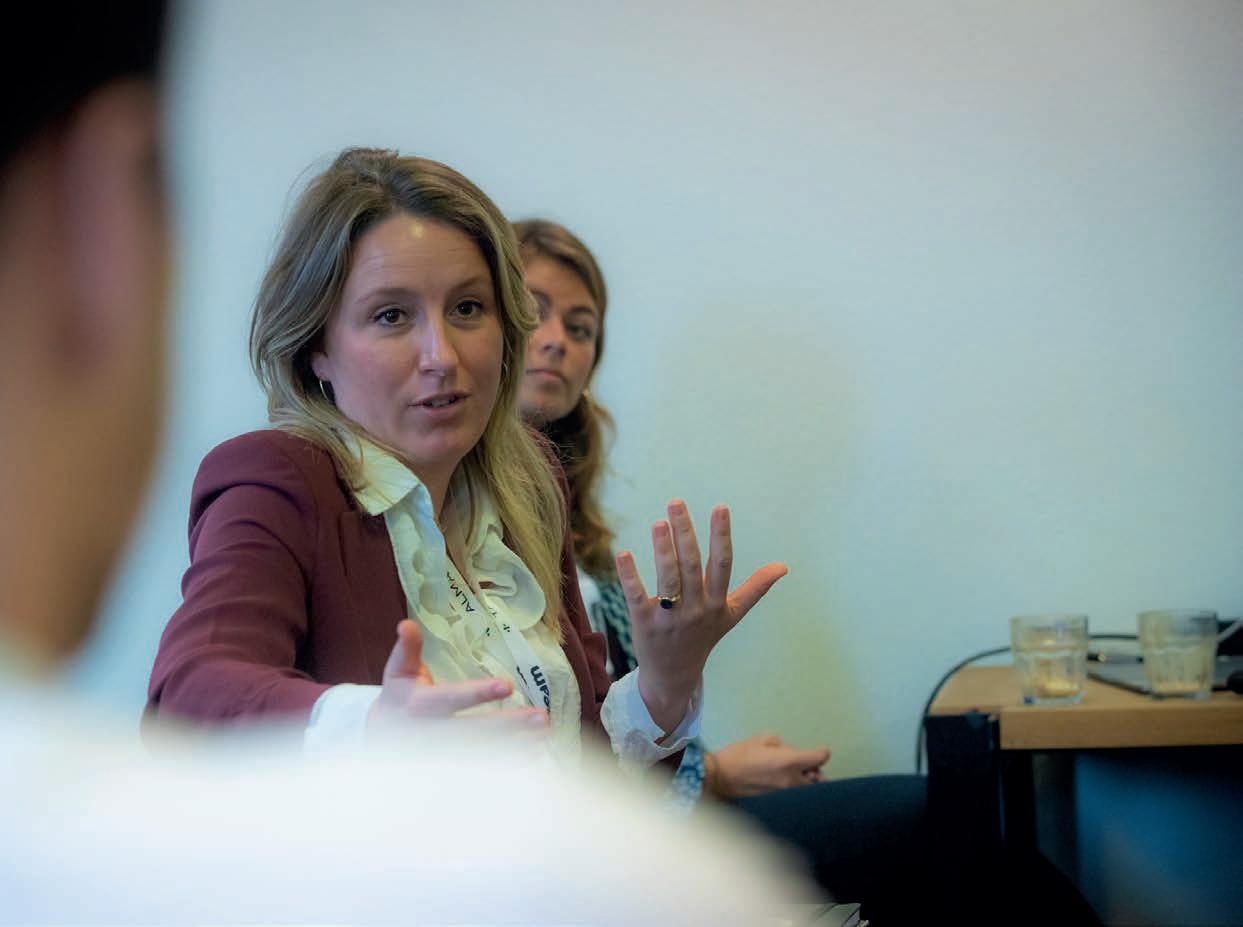
But how do you build an inclusive workplace? How do you convince management of its importance? Where do you find new employees with a diverse background? And when they come to work for you, how do you ensure that they also feel at home? And that they are not shy to share their diverse point of view?
NewBees Inc. advises employers on an inclusive workplace. Because inclusive organizations where employees feel at home, are more productive, creative and successful. As experts in the field of inclusion, we help employers to integrate Diversity & Inclusion into the organization.
We do this by providing practical tools that stem from our own experience as an inclusive organization.
At NewBees INC. we believe in a method of interactive programmes that stimulate and motivate people on a daily basis. NewBees experts share tips and tricks, give practical assignments that can instantly be carried out in teams and make use of out-of-the box tools like virtual reality experiences and escape rooms. This is how we go about this process with our clients and make a joint impact in the long term.
This is how we go about this process with our clients and make a joint impact in the long term.
Inclusive organizations consistently score better on productivity, absenteeism, turnover and both customer and employee satisfaction. Yet, this is by no means considered to be an issue of high importance to all employers, nor do they have the time and resources to address it. NewBees Inc. helps to give Diversity & Inclusion the right priority with the right arguments, and to make it part of strategy and business operations.
Teams with different perspectives come up with better solutions, and can appeal to a more diverse customer base. But where do you find this diverse talent? How can you best appeal to them and how do you become an attractive employer? NewBees INC. offers tools and practical tips to design your recruitment policy in a more inclusive way and attract diverse talent.
A diverse team does not necessarily mean an inclusive workplace. People from diverse backgrounds often struggle with cultural differences in the workplace. This can lead to them being less motivated and going to work elsewhere. More importantly, the full potential of their talent is not utilized. NewBees INC. advises and offers programmes in which inclusive work becomes the new norm.
NewBees INC. offers inspiration and practical tools for employers to shape an inclusive workplace.


As an organization, we are proud of what we achieved last year. Proud of the impact we had on Fadwa, Mahmoud, Mahdi, organizations like Brood & Spelen, and many other people, employers and neighborhoods.
In 2021 we invested in our product, in our people and in the relationship with important partners such as Nltraining. Together we offer dual integration programs, so as to create even more impact from 2022 on. NewBees continues to build an inclusive world, where there is room for everyone, for every talent. That starts for us with an inclusive workplace:
• We facilitate newcomers in their INTEGRATION IN THE LABOR MARKET by offering them our traineeships.
• We help municipalities to organize CIVIC INTEGRATION, so that new residents can immediately participate in the neighborhood in a positive and practical way by putting language into practice from day one.
• We assist employers in building an INCLUSIVE WORKPLACE, where everyone can be themselves and contribute optimally.
Of course, we want to set a good example as an inclusive employer by offering practical solutions for INTEGRATION and INCLUSION with our diverse group of colleagues, and by providing insight into the impact we make. Half of our colleagues have a refugee history; because only when our target group shapes the core of our services can we offer real quality.
In the coming years, we will continue to build towards an inclusive world, starting with an inclusive Netherlands. We offer practical solutions and have systemic impact; too many institutions and employers are still inaccessible to large groups of people and we are changing that. Because at NewBees we believe that an inclusive world is a more successful and more beautiful world.
Ook in 2022 hebben wij onze doelen vormgegeven in lijn met de drie strategische pijlers die NewBees al jaren aanhoudt: focus op mensen (people), kwalitatief hoogstaande diensten (product), en een goede relatie met onze partners (partners).
• People: at least half of our employees in 2022 have a refugee history. They indicate that they enjoy working at NewBees.
• Product: participants indicated that they benefited from our building blocks, both from the combination of these building blocks within the civic integration programmes that where co-designed with NLtraining and from the separate building block ‘traineeship’. They rate our programmes with a 7 or higher.
• Partners: our partners are content about the cooperation with NewBees. Partners in implementation, such as NLtraining, and other designers of our building blocks, such as the municipalities NewBees works for, indicate that they would recommend NewBees as a partner to others.
• People: NewBees INC. works with a range of diverse trainers who help shape its services to employers. At least 50% of them have firsthand experience in the field of diversity.
• Product: NewBees INC. offers innovative products in the field of Diversity & Inclusion that support employers on a daily basis in shaping and implementing their policies in order to create an inclusive workplace.
• Partners: customers rate the services of NewBees INC. with at least a 7. They recommend that other employers also work with NewBees Inc.
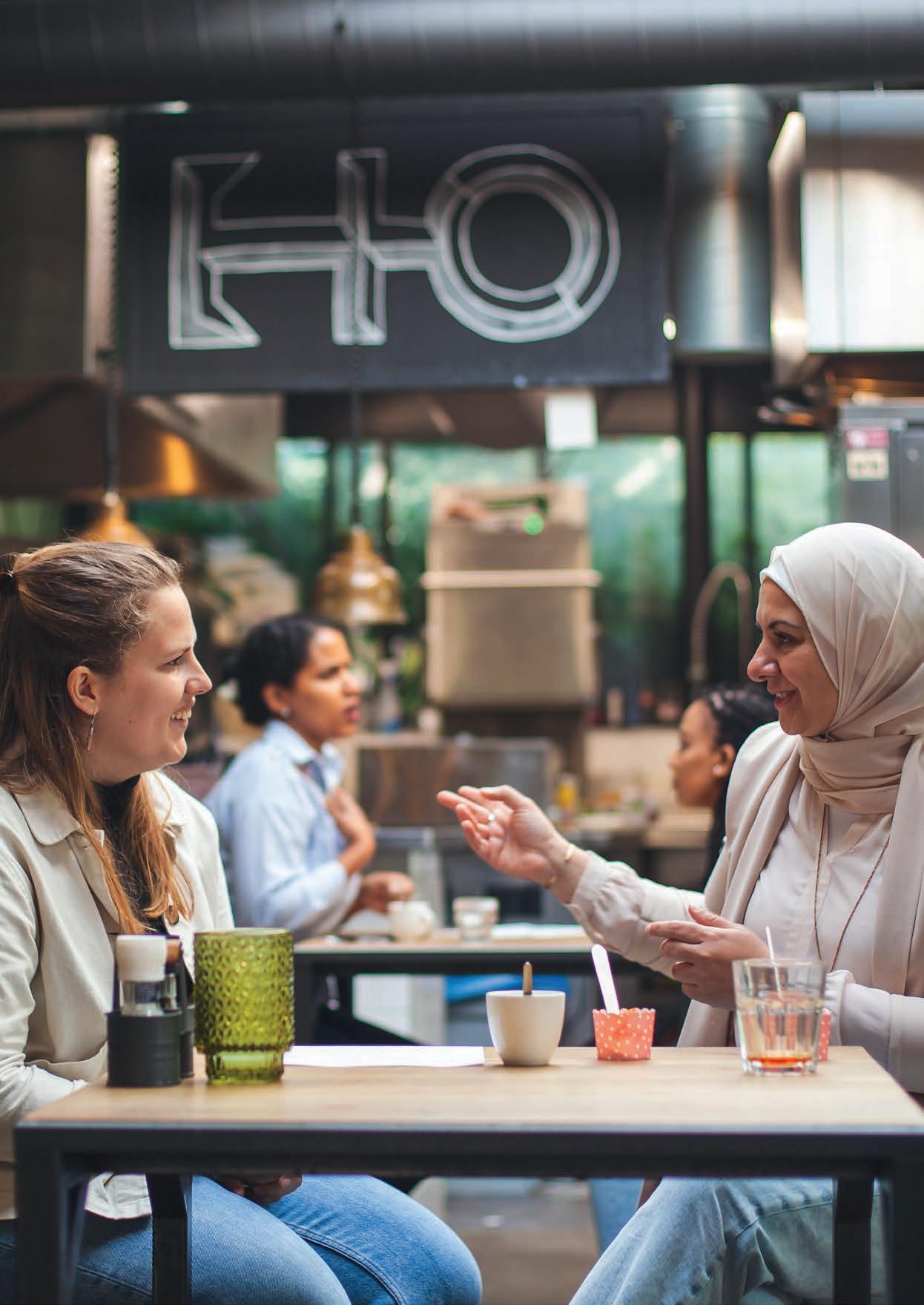
As a social enterprise, NewBees’ social mission comes first. Our products and services aim to make the world a better place. Impact first! That is why we cherish and encourage the creativity and fun that we have had in the past six years with each other, our clients and our partners. Because if our work is not only perceived as good, but also as fun, our impact will increase.
The 2030 Agenda for Sustainable Development, adopted by all member states of the United Nations in 2015, provides a blueprint for peace and prosperity for people and the planet, now and in the future.
At its heart are the 17 Sustainable Development Goals (SDGs): an urgent call to action from all countries - both developed and developing countries - in a global partnership. They recognize that ending poverty and other hardships must go hand-in-hand with strategies that improve health and education, reduce inequality and stimulate economic growth – all while tackling climate change and working to conserve our oceans and forests.
NewBees wants to contribute to this and specifically embraces three of the 17 Sustainable Development Goals in its mission.
SDG 8
Through its traineeships, NewBees offers participants the opportunity to work with their talent and thus participate in the labor market in a sustainable way.
SDG 3
Good health and well-being
NewBees believes in talent, and in a society where everyone has the opportunity to use their talent. When people can use their talent in their daily work, their well-being increases.
NewBees believes that based on talent and equality, everyone can contribute to society.
NewBees is a social enterprise. As of 2020, the ‘NewBees Foundation’ is a priority shareholder of ‘NewBees Inclusion Solutions B.V.’, which carries out all of NewBees’ activities. The Foundation has a strong voice in the organization, especially when it comes to decisions that affect the social mission of the company. Besides the ‘NewBees Foundation’, which has ANBI status*, founder Annemiek Dresen is a NewBees shareholder through ‘Novato Holding B.V.’. The ‘NewBees Foundation’ and ‘Novato Holding B.V.’ both have a seat in the shareholders’ meeting of ‘NewBees Inclusion Solutions B.V.’ This way, the social purpose of the organization is protected and it can participate in economic transactions in an entrepreneurial way.
The bylaws of ‘NewBees Inclusion Solutions’ follow the ‘Social Enterprise Code’ and as such include:
• A thorough description of the organization’s social mission;
• An impact reserve. For 2020, 2021 and 2022, this reserve has been set at 100% of the potential profit: This means that all potential profit flows back into the social mission of the organization and is not distributed;
• An independent advisory body**. In the case of NewBees, the ‘NewBees Foundation’ has this function, whereby it has additional powers as holder of a priority share. This means that the board of the foundation has to approve important decisions about the social mission of the organization, the profit distributions and the impact reserve;
• Limitations on the remuneration of directors and management fees, such as those paid to ‘Novato Holding B.V.’, and the director of the organization;
• NewBees always communicates in a transparent manner about its activities and finances, and is in constant dialogue with its various stakeholders.
* The ‘NewBees Foundation’ is recognized by the tax authorities as an ANBI (non-profit tax designation in the Netherlands), which means that every donation is tax-deductible. As an ANBI, we are obliged to present our policies and plans on our website.
As of January 1, 2014, a monthly donation to an ANBI organization is 100% tax deductible, provided that this donation is repeated five consecutive years. Contrary to previous regulations, a notary is no longer obliged to record such an agreement. Are you interested or do you have any questions? Please contact us.
As an ANBI, we are obliged to present our policy and plans on our website. You can read more about this on the Traineeship page of our website and in our annual reports.
** The NewBees supervisory board: As a social enterprise and an ANBI, it is important that our supervisor has no financial interest in our activities. We can assure you that the board functions completely on a voluntary basis and that, regardless of the time and effort invested, its members receive no financial contribution: Hanna Zwietering, Mireille Goos and Andrew Trythall.
Fixed

















With special thanks to:
The editorial team

Annemiek Dresen, Nadia Schoenzwytt, Sacha Bouma
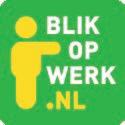
Photographer Mo Alzoabi (alzoabi.nl)



Design

Vincent Verwoert (dit is vinz.)

Copyright
All rights reserved. No part of this publication may be reproduced, stored in a retrieval system, or made public in any form or by any means, electronic, mechanical, photocopying, recording, or otherwise, without the prior written permission of NewBees.
About NewBees
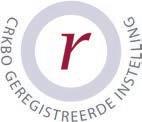







NewBees was founded in 2016 and is a social enterprise.
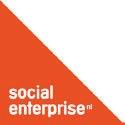
Mailing address: Chris Lebeaustraat 4 1062 DC Amsterdam www.new-bees.org info@new-bees.org
